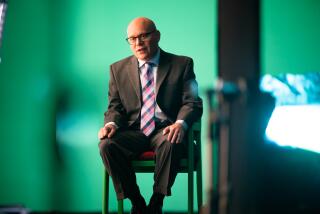TV REVIEW : A ‘Divided’ Look at Recovered Memory
- Share via
When she made her superb two-part “Frontline” report “Innocence Lost” on the Edenton, N.C., child abuse case, filmmaker Ofra Bikel offered a kind of demilitarized zone for the small town’s warring factions.
All of their hopes and fears and paranoias surrounding stunning claims of ritual child abuse in the hundreds were laid bare in front of Bikel’s camera. They all trusted her, even if you couldn’t help wondering whether she believed them.
The same dynamic propels Bikel’s new two-part, four-hour work for “Frontline,” “Divided Memories.” Now she has taken her camera to a new but related psychosocial war front, pitting children who claim repressed memories of being abused as children against their parents.
This deeply emotional sparring, though, is heightened by a parallel debate between a movement of psychotherapists practicing “recovered memory” techniques and mental health scientists and feminists who harshly condemn the movement as quackery and exploitative.
Bikel’s great achievement is to track both of these clashes until it seems that the very heart and soul of the country is at stake. Is there truly an unprecedented level of ongoing incest and child abuse in the United States--as the recovered-memory therapists and advocates claim--or is the “inner child” craze another example of American infantilization? Are women the vast majority of recovered-memory patients because fathers typically abuse daughters, or is the new psychotherapy a new method of keeping women dependent?
“Divided Memories” suggests that all of these could be true at the same time, but, as in “Innocence Lost,” Bikel is fascinated at how the spark of vague fears can turn into a social wildfire.
In tonight’s opening two hours, Bikel dwells on the claims of recovered-memory patients. Some, like the case of Jane Sanders (whose mother got an admission of incest out of her husband), come off as very credible cases of incest and abuse. Some, like Ann Rose, who changed her name to Kate, begin with the slightest sense of a bad memory and develop into explicit, incredible accounts of satanic ritual abuse and murder.
In Rose’s case, after many years in therapy with Laguna Beach-based therapist Douglas Sawin, she decided to sue her parents and grandparents for $20 million in damages. Sawin, as do other therapists, tells Bikel that he is trained to believe his clients such as Rose. But when claims become lawsuits, more proof is required than trust.
According to such recovered-memory critics as psychiatrist Dr. Salvador Minuchin and former recovered-memory advocates as Paul Simpson, trust is about all these therapists have. Minuchin states emphatically that the scientific evidence to prove that removal of repressed feelings can uncover memories does not exist.
“Divided Memories” becomes one of television’s most extraordinary investigations into the legitimacy of psychotherapy itself--its pseudo-religious aspects, its penchant for launching pop movements that soon fizzle, its preference for feelings over reason. The children of Freud are now at an unprecedented crisis point.
* “Divided Memories” airs at 9 tonight on KCET-TV Channel 28 and at 8 p.m on KVCR-TV Channel 24. It concludes next week.
More to Read
The complete guide to home viewing
Get Screen Gab for everything about the TV shows and streaming movies everyone’s talking about.
You may occasionally receive promotional content from the Los Angeles Times.






